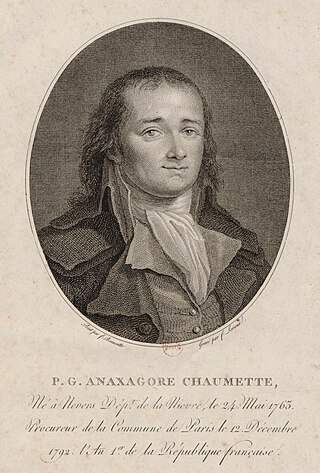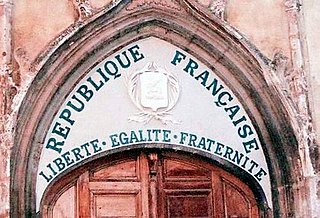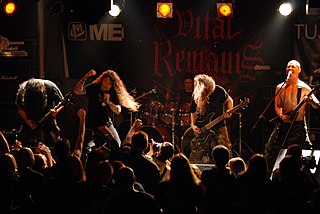
The French Republican calendar, also commonly called the French Revolutionary calendar, was a calendar created and implemented during the French Revolution, and used by the French government for about 12 years from late 1793 to 1805, and for 18 days by the Paris Commune in 1871, and meant to replace the Gregorian calendar.
Roman or Romans most often refers to:

Pierre Gaspard Anaxagore Chaumette was a French politician of the Revolutionary period who served as the president of the Paris Commune and played a leading role in the establishment of the Reign of Terror. He a leader of the radical Hébertistes of the revolution, an ardent critic of Christianity who was one of the leaders of the dechristianization of France. His radical positions resulted in his alienation from Maximilien Robespierre, and he was arrested and executed.
Christian Brothers may refer to:

Jacques René Hébert was a French journalist and leader of the French Revolution. As the founder and editor of the radical newspaper Le Père Duchesne, he had thousands of followers known as the Hébertists. A proponent of the Reign of Terror, he was eventually guillotined.

Laïcité is the constitutional principle of secularism in France. Article 1 of the French Constitution is commonly interpreted as the separation of civil society and religious society. It discourages religious involvement in government affairs, especially in the determination of state policies as well as the recognition of a state religion. It also forbids government involvement in religious affairs, and especially prohibits government influence in the determination of religion, such that it includes a right to the free exercise of religion.
Anti-clericalism is opposition to religious authority, typically in social or political matters. Historically, anti-clericalism in Christian traditions has been opposed to the influence of Catholicism. Anti-clericalism is related to secularism, which seeks to separate the church from public and political life.

Vital Remains is an American death metal band from Providence, Rhode Island, formed in 1988.

The aim of a number of separate policies conducted by various governments of France during the French Revolution ranged from the appropriation by the government of the great landed estates and the large amounts of money held by the Catholic Church to the termination of Christian religious practice and of the religion itself. There has been much scholarly debate over whether the movement was popularly motivated or motivated by a small group of revolutionary radicals. These policies, which ended with the Concordat of 1801, formed the basis of the later and less radical laïcité policies.

Saint-Flour is a commune in the south-central French department of Cantal, approximately 100 km south of Clermont-Ferrand. Its inhabitants are called Sanflorains.

Dechristianize is the fifth album by American death metal band Vital Remains. It was released on August 22, 2003. The lyrics deal with the Dechristianization of France during the French Revolution. The intro - "Let the Killing Begin" - features a section of Carl Orff's "O Fortuna" and voices from the film The Greatest Story Ever Told. This album was the first to feature Deicide vocalist Glen Benton, and is generally considered to be the band's breakthrough album.

Pedro Poveda was a Spanish Catholic priest, humanitarian, and educator. He was the founder of the Teresian Association. His humanitarian-educational activity lasted for over 30 years, until his execution by persecutors of the Christian faith in 1936. Poveda was beatified in 1993 and canonized in 2003; his feast day is 28 July.

David Suzuki is an American death metal multi-instrumentalist from Las Vegas, Nevada. He is best known for his work as the guitarist, lyricist, bassist, and drummer for Vital Remains from 1995 to 2007 and as a touring guitarist with Deicide from 2004 to 2005. Since 2011, he has been the guitarist and vocalist for the doom/death metal band Churchburn.

Holy See–France relations are very ancient and have existed since the 5th century. They have been durable to the extent that France is sometimes called the eldest daughter of the Church.
Integral Humanism may refer to:
Events from the year 1793 in France.
Fascism is a political ideology, advocating an authoritarian, hierarchical government.

Anti-Christian sentiment, also referred to as Christophobia or Christianophobia, constitutes the fear of, hatred of, discrimination, and/or prejudice against Christians, the Christian religion, and/or its practices.
This page is based on this
Wikipedia article Text is available under the
CC BY-SA 4.0 license; additional terms may apply.
Images, videos and audio are available under their respective licenses.











